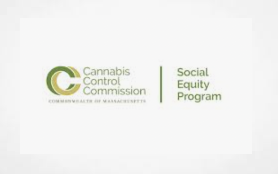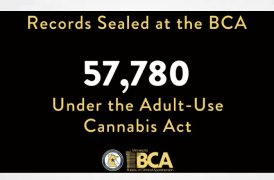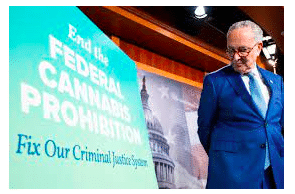Bloomberg report
On July 14, 2021, U.S. Senators Chuck Schumer (D-N.Y.), Cory Booker (D-N.J.) and Ron Wyden (D-Ore.) released a long-anticipated bill that would provide for comprehensive federal cannabis reform.
The Cannabis Administration & Opportunity Act (CAOA or the Act) is a discussion draft rather than legislation that has been formally introduced. The sponsors seek comment from stakeholders about the discussion draft by Sept. 1, 2021. The Act, in its current form, would legalize and regulate cannabis federally, similarly to the way alcohol and tobacco are currently regulated.
It is a far-reaching proposal addressing social equity, restorative justice, research, and taxation while preserving the integrity of existing state cannabis laws. At the federal level and for purposes of interstate commerce, cannabis would no longer be a controlled substance under the Controlled Substances Act. State law would control possession, production, and distribution of cannabis. States could continue to keep cannabis illegal but would be prohibited from restricting the interstate commerce of cannabis transported through those states. While there is plenty in the CAOA to discuss and debate, the proposed tax regime deserves close attention from lawmakers, industry participants, and consumers.
With cannabis no longer being a controlled substance federally, industry participants would be freed from the crushing financial effects of tax code Section 280E. Section 280E states:
“No deduction or credit shall be allowed for any amount paid or incurred during the taxable year in carrying on any trade or business if such trade or business (or the activities which comprise such trade or business) consists of trafficking in controlled substances (within the meaning of schedule I and II of the Controlled Substances Act) which is prohibited by Federal law or the law of any State in which such trade or business is conducted.”
In practice, Section 280E does not allow state-level legal cannabis businesses to deduct ordinary business expenses when determining gross income from the sale of inventory. While deductions for cost of goods sold are permitted, not being able to deduct real estate or employee expenses, for example, imposes a heavy tax burden on cannabis retailers and processors. Cultivators also suffer from not being able to take advantage of standard business deductions and credits, but they benefit more from permissible cost of goods sold deductions due to the nature of their business. Cannabis businesses have proven to be solid revenue generators, however, profits can be severely depressed when subject to effective local, state, and federal tax rates as high as 90%.
The proposed tax regime borrows heavily from the federal excise taxes applied to alcohol and tobacco products (with no distinction between medical and recreational cannabis) that are based on volume, potency, or a percentage of price. All taxes on cannabis products are incurred at the point of importation or removal from the producer’s premises. The Act allows for in-bond transfers to ensure that the excise tax is only paid once.
For the implementation year and first year, the tax rate would be 10% of the removal sales price, and this rate would increase by 5% in each of the following three years, reaching 25% at year four. In the fifth year and after, the application of the excise tax moves from the removal sales price of the product to a hybrid prevailing price and per-ounce or per-milligram of THC model. Cannabis would be taxed at 25% of the prevailing price of cannabis per-ounce for cannabis flower and per-milligram of THC for any cannabis extracts.
The prevailing price of cannabis sold in the U.S. in the prior year would be determined by the Treasury Department. In an attempt to lower barriers to entry, small producers with less than $20 million in sales would see a 50% reduction in the annual tax rate in the form of a tax credit. Larger producers would see a similar credit only on their first $20 million in annual sales. All tax revenue would be directed to the Opportunity Trust Fund. The fund intends to promote social equity goals through equitable licensing and financial support to industry participants and communities that have been disproportionately impacted by the War on Drugs.
The CAOA’s proposed tax regime raises a number of important practical and policy questions that should be considered by the Act’s sponsors. First and foremost is whether the graduating excise tax rate is too high, such that it will incentivize the illicit market to continue to operate illegally and without regulation or taxation. In addition to the concern that the tax burden on the regulated market might leave too much room for the illicit market to undercut legal market participants, policymakers need to consider whether the addition of federal excise taxes as proposed would create too heavy a tax burden on the industry. In many states, state excise taxes combined with state and local sales taxes and the proposed federal excise tax would impose tax rates of more than 50% on cannabis products.
Industry participants should take the opportunity to analyze the tax consequences on producers, as defined under the Act, if the burden imposed on Section 280E is removed and the suggested federal excise taxes are imposed. It would be instructive to know whether current industry participants would have historically been any better off financially under this new regime and, if so, by how much. Further, consideration should be given to how much of this additional tax burden will be passed on to consumers in the form of higher retail prices and the effect that higher prices may have on the market. Perhaps this analysis will help inform what fair and reasonable tax rates should be for industry participants who have long suffered from Section 280E’s negative effects, while balancing the revenue-generating goals of the Act and disincentivizing the continuation of the illicit market.
The CAOA does not explain how the Treasury Department will determine the prevailing national price of cannabis flower on a per-ounce basis or per-milligram of THC for extracts. Because cannabis comes in so many varieties at such different price points and is taxed differently from state to state, landing on a single national price could be difficult and potentially arbitrary, particularly for cannabis flower, if not carefully thought through.
Read the full report at. https://news.bloomberglaw.com/daily-tax-report/federal-taxation-of-cannabis-under-proposed-legislation

















